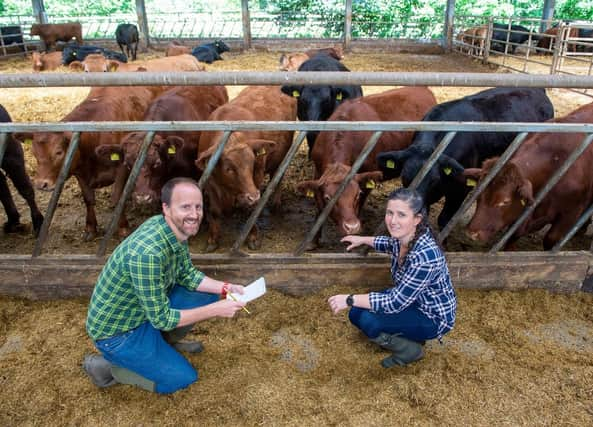Farming: Methane capture system plan for green cattle sheds


The SRUC-led GreenShed project which yesterday received £2.9 million of funding from the UK Government through its £54 million Net Zero Innovation Portfolio (NZIP) hopes to be able to remove the equivalent of 237 tonnes of carbon dioxide per farm per year.
The project will use the bedding and manure produced by the cattle in an anaerobic digestor which will power the novel system to remove methane captured through a controlled ventilation system on the shed. Any extra power produced by the AD plant will be used to run a vertical farm unit capable of producing fruit and vegetables – with the resulting low carbon fertiliser will be recycled on the farm.
Advertisement
Hide AdAdvertisement
Hide AdThe building of the shed, which is supported by partners at the University of Strathclyde, Agri-EPI Centre, Edinburgh-based No Pollution Industrial Systems Ltd, Galebreaker Agri, Organic Power Ireland, N2 Applied and Saturn Bioponics, is set to begin on the SRUC’s farm in Midlothian later this year.
The college said that it was hoped that if the project proved a success, farmers would not only be able to lower their carbon footprint but could benefit from an additional income stream of up to £40,000 a year, while it was estimated that a 100-cattle shed using the GreenShed system could also save them £1,000 a year in fertiliser and heat energy costs.
John Farquhar of SAC Consulting said that while the shed did not need to be totally sealed, it used negative pressure to circulate air in a similar manner to commercial ventilation systems – allowing the methane, which had a warming potential 28 times higher than CO2, to be removed and used for combustion.
He said it was hoped the system could be rolled out commercially by the partner organisations at the end of the three year project.
Professor Wayne Powell, principal and chief executive of SRUC, said: “GreenShed provides an innovative working example of how researchers, businesses and other partners can collaborate effectively to shape a more resilient, nature-positive producer supply chain that’s aligned with the aims of the national Food Strategy. We are hugely grateful to ministers for their support.”
SRUC’s Dr Carol-Anne Duthie, who leads the project, added: “We’re thrilled to have received this funding to make the exciting GreenShed project a reality. The value of the project is clear: farmers will improve their profitability, expand their saleable food products, and reduce the environmental impact of beef production.”
Energy and Climate Change Minister Greg Hands said project GreenShed GreenShed addressed the need for the livestock farming sector to reduce its greenhouse gas (GHG) emissions whilst improving productivity, by developing an integrated low-carbon, circular, cattle and vertical farming system.
He said that the system to capture methane optimised resource efficiency – and if implemented across the sector could equate to 50 per cent GHG reduction from these systems.
Comments
Want to join the conversation? Please or to comment on this article.